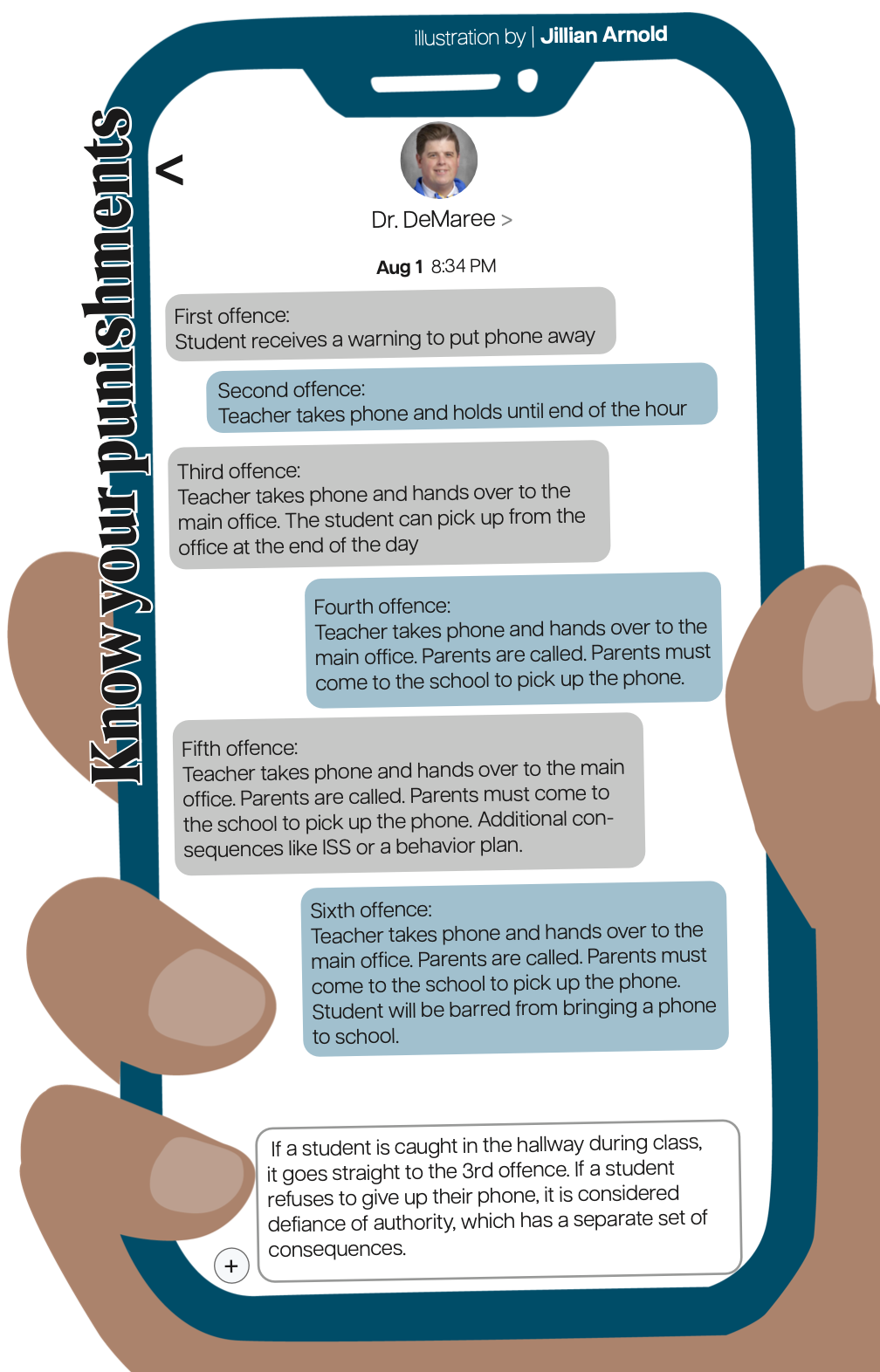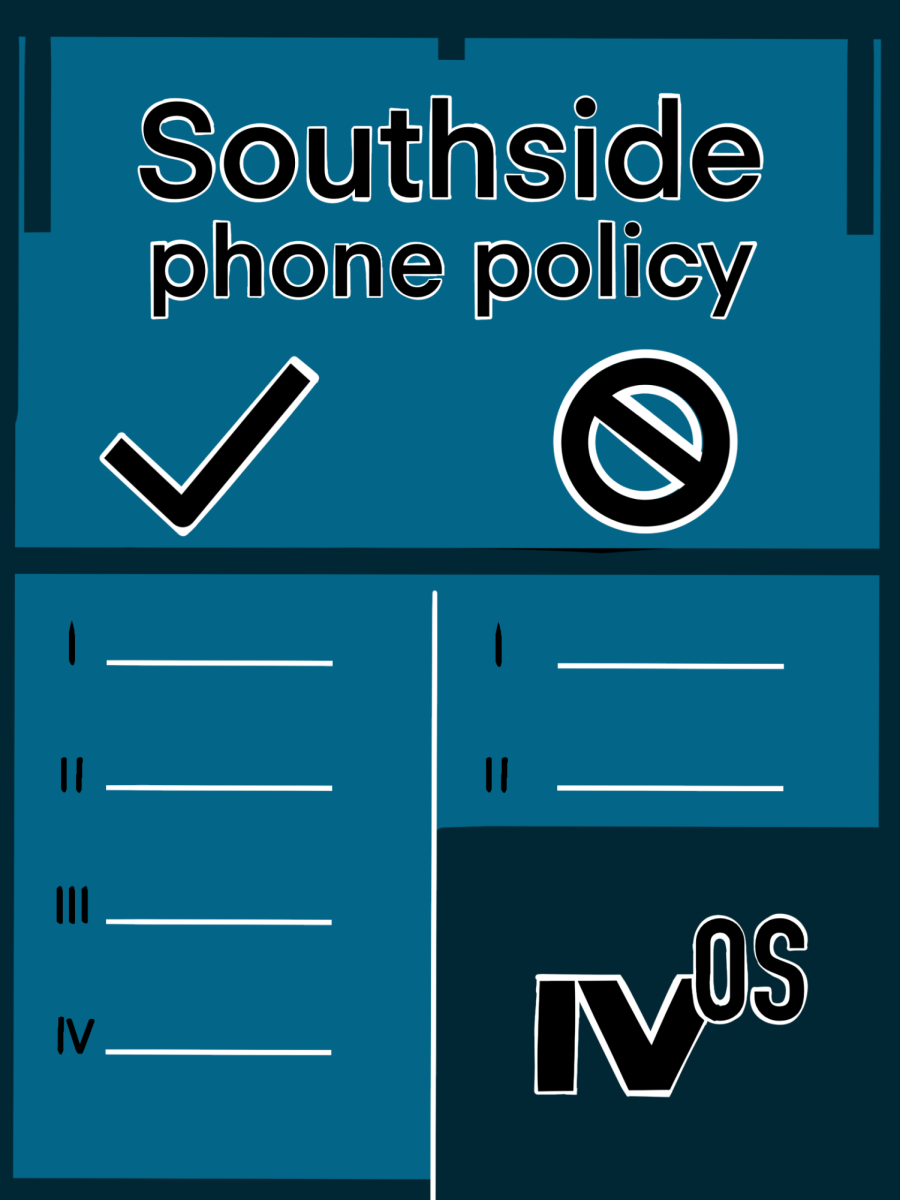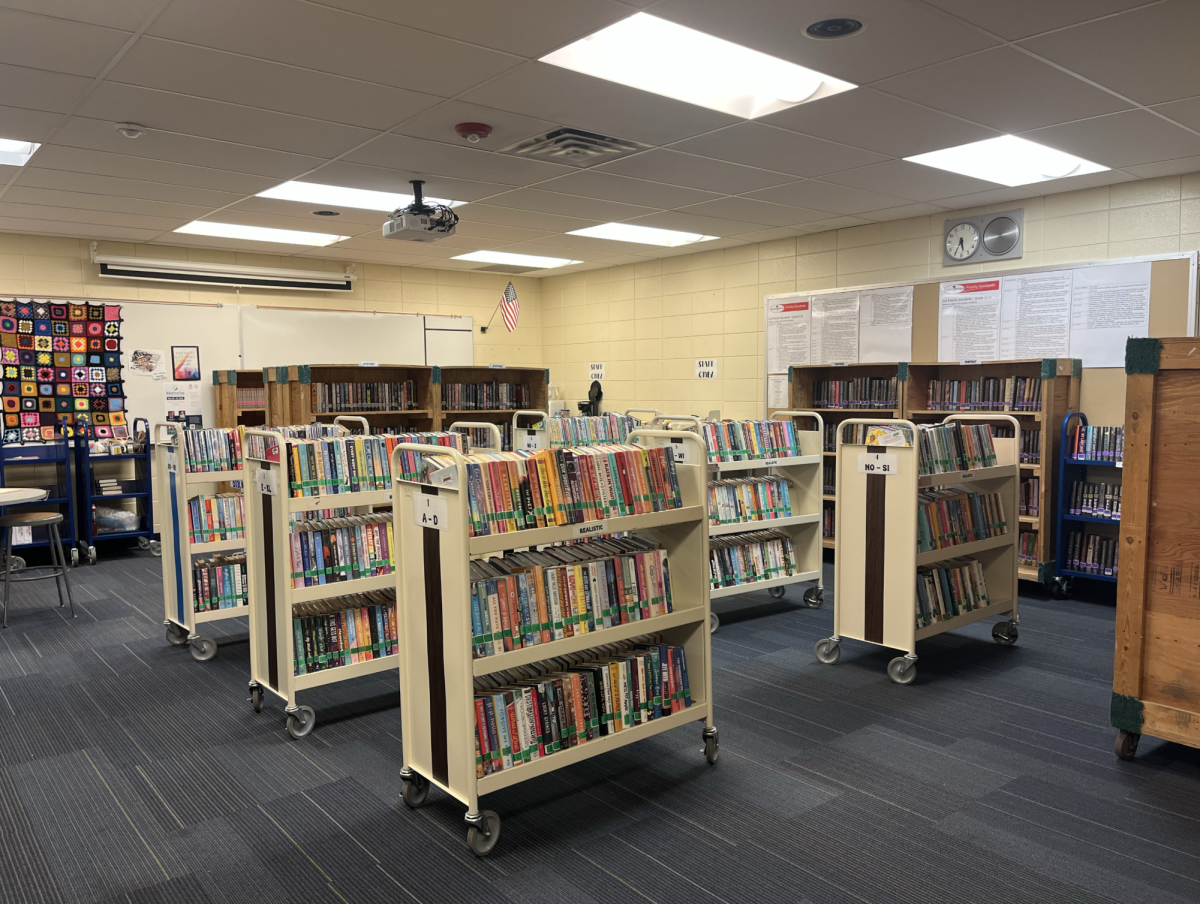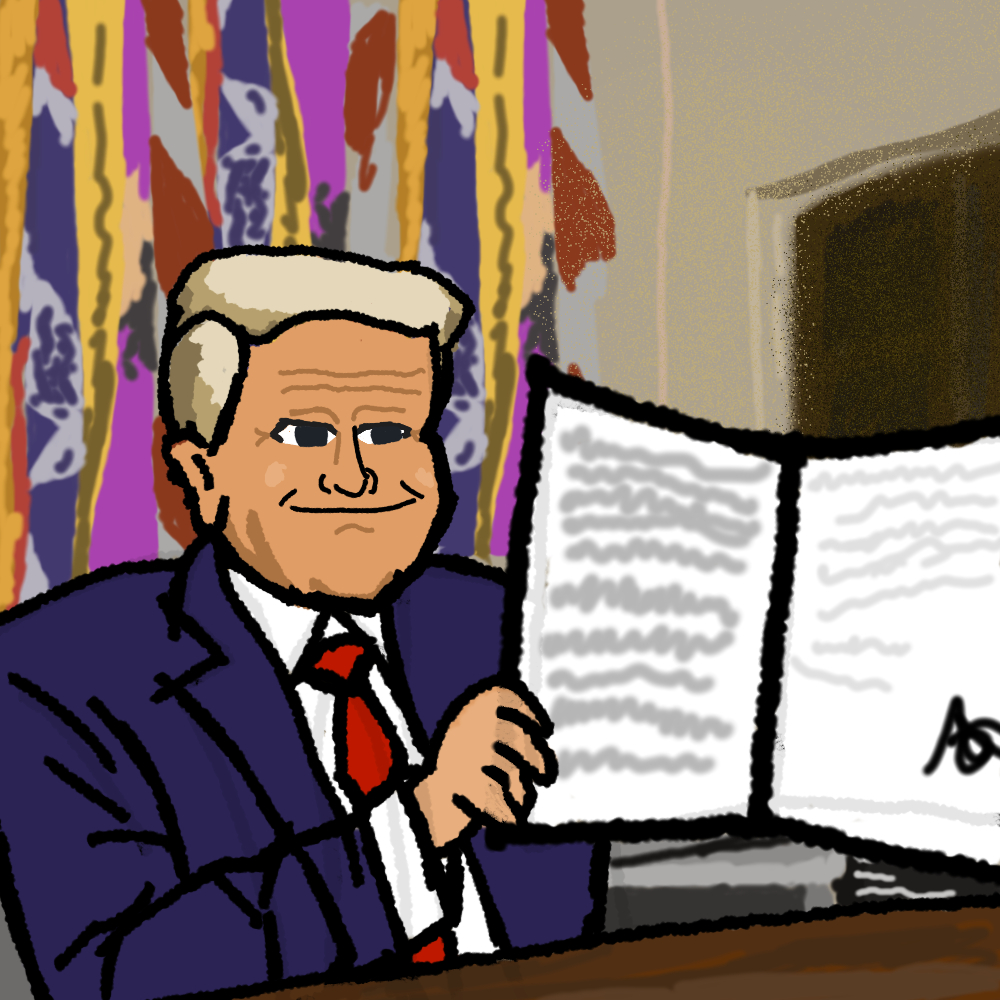A new cell phone policy prohibits phone usage during class unless for an educational purpose across the district, coming with new punishments at each school. Principal Dr. Sean DeMaree explains the policy is simply saying that in high school there are no cell phones during the school day.
“So [in the] hallways is fine, before and after school is fine, lunchtime is fine,” DeMaree said. “Just, kind of, in the moments where you’re in the classroom, which we focus on learning, cell phones go away.”
Many students and parents were concerned about what would happen during an emergency situation. According to Vice President of the School Board Julie Steele, emergency situation can be a floating term.
“We explained that in an emergency situation, access is absolutely approved,” Steele said. “If there is an emergency, nobody is going to get in trouble for grabbing their phone.”
Steele continues it is almost impossible to assess different policies for different age groups, proving that it would be difficult for each grade level in a particular school to have different rules. Though difficult, Superintendent Dr. Brent Yeager explains how this is exactly the reason the high school level has a different set of rules.
“That was one of the things that our board of education really wanted us to think about, was more opportunities for our students in high school,” Yeager said.
In creating the policy, board members wanted students to know it’s not just driven by one individual person
“This isn’t just the opinion of some board members who think they know things,” Steele said. “Maybe we’re hearing from students, from educators, from administrators, from parents, and then we go, ‘we have something going on here we really need to pay attention to. Let’s dig into this.’”
Yeagers has multiple groups he meets with to talk about what’s happening in the schools and community that influence how policies are created. He met with his teacher, student, and parent advisory groups to discuss the policy and all resoundingly supported the policy.
“Then after we did all of that, our attorney, who worked full time in the school district for us, got a committee together to analyze all the information we got from those groups to try to come up with a policy that met the very needs across our system,” Yeagers said.
This policy was not a spur of the moment thing and had been talked about for about a year before the final policy was created.
“We started our conversation early last school year, in terms of the need to look at a policy,” Yeagers said. “And actually, our staff members had shared with a board member at the time that we need to do something consistently across the district, and so the board member reached out to me and said, we need a cell phone policy.”
The cell phone policy is not limited to the Olathe School District, many schools around the nation are passing phone policies, and some are even passing full bans. After the shooting at Olathe East, the district wanted to steer clear of that.
“We learned a lot from the shooting at Olathe East, but one of them was that students were comforted that they could actually have access to their phones to reach a loved one when they were in a state of distress,” Steele said. “And we didn’t want to take that away.”
The board chose to allow each school to create their own punishments within the policy because they believe local choices and control is the best.
“We believe so strongly in a school district of over 29,000 kids that we have to drill down on our administrators in the building. They are the ones who know their community and their kids the best, and so to just have a blanket discipline policy really did not make sense to us,” Steele said.
One of the main reasons the policy was passed was to ensure that there was consistency across the district, giving something for teachers to stand on according to Board of Education member Becky Johann.
“[We] developed a policy to just give something for teachers to limit distractions within class and really focus more on education and give them something to stand on, really empowering them to be able to say, ‘Okay, it’s time to put them up. Let’s, you know, focus on education’ and really just giving some parameters,” Johann said.
Based on current research, depression, anxiety and self harm levels are at an all time high. DeMaree believes this directly relates to bullying which is biggest online right now. By limiting phone usage in schools he hopes students who are getting bullied get a little sense of relief.
“So in the past, the thing that worked well for us is that we did what we could on the school side,” DeMaree said. “Of course, we’re always going to do our best to try to minimize and get rid of bullying, but we always had that comfort of, you’d always go home and have a break, and now we’re trying to reverse that and basically say we’re going to try to guarantee you a break from the second you walk into the school until the end of the day.”
In the past few years, there has been a drop in academics that DeMaree believes also correlates to phone usage. He believes that no matter how good one is in school, one can never be fully focused when phones are present.
“We think we’re focused. We think having our phone out [is] not a big deal, but it is, whether you realize it or not. You just become so accustomed to having it there, you don’t realize it’s distracting you. And so by having it out of sight, out of mind, I’m going to have more time and better attention to what my teachers are telling me so I can learn better,” DeMaree said.
According to athletic director Andrew Miller, leaders in the district are not naive to the fact that phones are a big part of life, although they realize the impacts phones have on students. He believes that this new policy will help students in the long run, allowing for students to be more focused and come together.
“You have, number one, improved focus in class. Kids aren’t distracted when they don’t have their cellular device,” Miller said. “I also think just kids interacting with each other versus immediately turning to a cell phone, will help increase our sense of culture and belonging.”
After receiving some concerned comments from parents at back to school night, DeMaree expressed to parents another reason this policy was put into place was to limit other issues that present themselves inside of schools.
“Hey, parents, you want us to do something about bullying? You want us to do something about vaping? A lot of these things begin with a cell phone. So please understand this is helping those things you’re asking us to do,” DeMaree said.
He also encourages that this policy was put into place to ensure that students are prepared for their futures.
“You only have 13 years of school, and really high school, you have four years, and then you’re out of here and you’re in the real world. And so we’re just trying to ensure we’re giving our students everything they need, every tool they need, so when you leave us, you’re ready for life, and cell phones are part of that,” DeMaree said.
When it comes to punishments, while there are guidelines in the student code of conduct, each high school has the freedom to come up with it’s own set of rules within the policy. If it continues to be a problem, then the student will be referred back to the student code of conduct.
“So if you read at the beginning of the Student Code of Conduct, before any of those classes of offenses are listed, it says that all administrators at every level have the flexibility to navigate the discipline side of that as they see fit,” Steele said.
In the policy, it states “The board is committed to having an environment in all schools that is conducive to learning; orderly; free from unnecessary distractions, and promotes the responsible use of technology by all individuals.” DeMaree believes this policy will help students promote personal responsibility.
“A big piece of it is just learning how to not have a cell phone and be okay with that, which sounds silly, but honestly, we do struggle,” DeMaree said. “Just to realize that choices have consequences, and at a school level, consequences are things like losing your cell phone.”
DeMaree believes prioritizing the things that are the most important also plays into personal responsibility.
“We’re responsible for what you learn, and actually, students are obviously responsible for that as well,” DeMaree said. “So I think for us, part of the responsibility piece is us helping prioritize what’s most important, and that is, you know, likely what’s happening in class, not on Snapchat or whatever the case may be, right?”
A teacher’s job is to enforce the policy in schools and make sure that students are following what is expected of them. According to DeMaree, teachers must be a part of the team no matter how they feel about the policy in order to not cause problems for other teachers in the building.
“What our teachers don’t realize is that if you’re that one teacher who allows cell phones, who’s super relaxed about the cell phone rule, you’re actually harming everybody else who’s following the rule, because now it’s not a case of you’re the cool, fun teacher. No, it’s that everyone else is strict and mean, and you’re not, and that’s the reality,” DeMaree said.
DeMaree expressed that if there is a situation where a teacher isn’t following the policy and an admin notices, that admin is going to do what they can in order to help that teacher better follow the rules.
“If I’m seeing 10,15 phones out in the classroom, then yeah, I’m [going to] have a conversation with that teacher about the cell phone [policy] and talk about, hey, you know, this is a policy you’re supposed to be enforcing, and I’m not seeing that in your classroom. Do you need help enforcing it? And my first step is to help my teachers out and be there to support them through that,” DeMaree said.
Miller has faith that all the teachers are following the guidelines and wants to assure them that the admin team is there for them if they have any issues.
“They know we’ll support them in their classroom, and know that if they need anything, we’ll help them out enforcing that cell phone rule,” Miller said. “So again, adjusting to it. It’s not an overnight thing. At this point in the semester, we hope that teachers are feeling more comfortable with the policy, but we also understand if they have questions, they always know our doors are open.”
Leaders in the district have had positive responses to the policy so far.
“You know, so far, the response has been really overwhelmingly positive, and I think a lot of that goes to our students that we have in our district who’ve been really respectful of this and who’ve done a really good job of navigating this new policy right before school started,” Yeager said.
According to DeMaree some teachers and parents struggled to understand the policy because things are so different in this generation.
“I think back to when myself, a lot of our teachers and our parents were in school, and I think this is part of the reason why adults have a hard time understanding both why we have to have a cell phone rule, but also have a hard time understanding where students are coming from with this new rule is that we didn’t have cell phones at school,” DeMaree said.
Cell phone policies are being talked about at the state and national level. 
“The Kansas State Department of Education announced that they were going to appoint a task force of about 30 people across the entire state to look into a cell phone policy,” Steele said. “The state policy could override our local policy, and we don’t know what that task force will come up with.”
Even though the policy has already passed, it will be a topic of conversation in an upcoming board meeting in December.
“Certainly [we plan to] look at discipline data, if there’s pieces like that there, but is this policy too restrictive? Is it not restrictive enough? those kinds of things, is what I anticipate,” Yeager said. “And the board could vote to do something a little bit different or adjust the policy, and that would probably rely heavily on our recommendation as staff.”
With the future of the policy in the board’s hands DeMaree can only provide input based on what he sees throughout the year.
“The schools and principals don’t really have a lot of say in how that policy changes or shifts. We have a voice, so we can share our data, we can share our experiences, and the board can choose to do something with that information, but since it’s a board policy, it would be up to the board to make any changes,” DeMaree said.
DeMaree strongly believes that this policy was a good decision and that come December it will be shown that this policy isnt as big of a problem as they believed. He also wants to reiterate that this policy is new and will take time to get used to, but will benefit students in the future.
“I would say, be patient. But I promise everyone our Board of Education’s goal was not to harm anybody or to take away people’s rights or to make people feel unsafe or uncomfortable,” DeMaree said.







